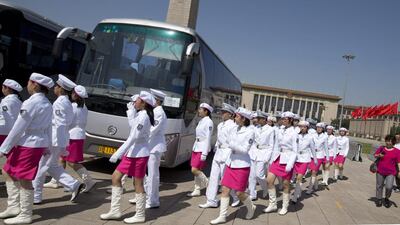BEIJING // Born in 1989, Steve Wang sometimes wonders what happened in his hometown of Beijing that year. But his curiosity about pro-democracy protests and the crackdown on them passes quickly.
“I was not part of it,” he said. “I know it could be important, but I cannot feel it.”
Twenty-five years after the Communist Party’s attack on demonstrations centred on Tiananmen Square on June 4, 1989, it is little more than a distant tale to most young Chinese. The ruling party prohibits public discussion and 1989 is banned from textbooks and Chinese websites.
Many have managed to learn something about the crackdown, through people they know, by navigating around China's tight internet controls or by travelling abroad. Some are aware of the iconic image of resistance – the lone Chinese man standing in front of a line of tanks moving down the Avenue of Eternal Peace.
But often, they seem not to care. They grew up in an atmosphere of nationalism and pride over two decades of strong economic growth. The turmoil caused by a student movement 25 years ago seems irrelevant to a generation more worried about finding jobs and buying an apartment.
“They basically don’t bother to try to find out further,” said Fu King-wa, a journalism professor at Hong Kong University. “Even if they learn about it, they believe in the government version.”
Rowena He, author of the book “Tiananmen Exiles” which describes the lives of student protesters after the crackdown, said many Chinese students abroad claim they know a lot about it, but in fact know little. “Some others would say, ‘We knew what happened, so what?’ That’s typical,” said Ms He, who teaches at Harvard University.
Young Chinese tend to find it hard to empathise with students of the late 1980s, she said. “The younger generation is more influenced by cynicism and materialism,” said Ms He. “A Chinese student once said to me, ‘I really do not believe they took to the street for ideals.’”
Born in July 1989, in a Beijing hospital not far from the sites of the bloody crackdown, Mr Wang grew up without hearing a word about the student movement from his parents or teachers. He first heard about it from friends in college in China.
“I was quite curious and wanted to know about it. But I could not find anything,” Mr Wang said.
In 2010, he went to school in England, where he met a Hong Kong student who showed him a video of the crackdown.
“All I could remember was a young man trying to stop a tank from rolling forward,” Mr Wang said. The Hong Kong student “asked me why it has to be like this. I was stupefied.”
Mr Wang does not think the student movement would come up in any discussion in Beijing.
“Who would bring it up? There’s been no reason to talk about it,” he said. “Much time has passed since then, and China will not report it anymore. Now the foreign media want to make a fuss out of it. They are talking up the negative things about China.”
At Peking University, once a centre of student protest, Tiananmen seems to have little relevance to today’s students.
“It is not something that concerns us anymore,” said Zhang Yu, a graduate student in sociology.
Although some bold Peking University professors have shared their knowledge with their students, most keep the topic out of the classroom.
Chen Haoyun, a freshman majoring in aeronautics, said he first heard about it when a teaching assistant mentioned it in a history class.
“I do not know much about it. All I know is that it cannot be talked about,” said Mr Chen. “I am interested, but the school does not talk about it.”
The university’s party secretary, Zhu Shanlu, warns that teachers must be careful when speaking to students about Tiananmen.
“You must take responsibility for the students and their values. It’s like buttoning up the first button, and you cannot get the first button wrong,” he said when asked if the issue is not discussed on campus.
Even some young people with connections to the crackdown know little about it, including Wang Jiaying, a Beijing college student whose father participated in the student movement.
“He said he was not sensible at the time,” Ms Wang said of her father. “I think it was a special event at a special time, which cannot be discussed now.”
Her roommate, Lu Qiuxuan, 21, learned it about from her mother, who was at a Beijing hospital caring for her grandmother at the time. She told Ms Lu about the constant flow of wounded students. Ms Lu searched for information on Tiananmen when she was overseas.
“I didn’t expect it was this huge, and there were so many people, and so many injuries. I was shocked,” Ms Lu said.
“I don’t know what should be the right conclusion, as long as the Chinese government does not say anything,” she said. “I regret that people of my generation cannot learn and understand it during our school years, and I think that has changed our outlook about our future lives.”
* Associated Press

